Kenneth A. Camp's Blog, page 22
July 24, 2015
5 Things that Happen When God Has All of me

Does God really want all of me. This question challenges me. Surely God doesn’t expect to have all of me. Don’t I have free will? And my free will is to have some of my time, money, etc. for myself. Didn’t God just set things in motion for us to enjoy our lives however we want to live them?

Occasionally I meet someone who carries a sense of confidence and success that doesn’t come from themselves. It’s a sense of destiny. It’s as if God’s favor rests on them. They exude humility and peace that makes another comfortable in their midst. What they carry attracts others.
Do you know anyone like this?
I know the source, but I think I know why some who call themselves Christians carry this while so many don’t.
They allow God to have all of t hem .
When I am in the presence of a person like this, I am motivated to live the same way. I even resolve to live this way. Then I slide back into my comfortable, self-centered way of living. I “give” God some of my life. I attend church. Pray some. Read my Bible some. Help others some.
I can say that for brief periods throughout my life I have given God all of me to only take it back. As I ponder why I do this, I think it boils down to the simple truth that I want to control my life, not Him. I even believe that He would and could do a better job, but I still want to do it myself.
I want the glory when things go well, and I tend to wallow in pity when things go poorly. I wonder if I gave God all of me, would I lose my identity? In the core of who I am, I must think these things to be true.
What would happen if I gave God all of my life?
I would assume His identity . At our core, I think we all struggle with this. This though is the root of our struggle. God created us to assume His identity. When we don’t accept this, we flounder through life seeking approval, and yes, identity. Americans really struggle with this. We are raised to be our own person. But really we don’t know how to be our own person. Think about how when someone asks us about ourselves we often respond with things that give us identity—vocation, family, hobbies.
My agenda becomes His. Again, individualistic cultures struggle with this. And how we handle this reveals whether we have given our all to Him. Usually we respond in one of three ways:
It doesn’t even cross our mind to include God in our agenda. We go about our way making our decisions based on our own wisdom, knowledge, and wants.
We want God’s input, but it looks more like us making the decision first then asking Him to “bless it”. Besides didn’t He give us a mind and a will?
Then there is the person who begins each day asking God to direct their path, speak to their heart, guide their decisions. This person doesn’t need to know all the details of the plan, just illumination for what step to take next.
My fears fall away. Like a child holding a father’s hand, I have no fear when I give God all of me. I can trust that He will always do what is best for me. It is His nature.
My ways of coping end. We simply can’t handle life on our own. When we try, we always end up looking for something that helps us cope.
I hear His voice more clearly. Makes sense really. When I am listening to Him, looking for His guidance, I learn to recognize His voice and His hand in my life.
No wonder a person who lives like this has the favor of God on them. Once again I resolve to allow God to have all of me. It’s really all I have to give Him that He doesn’t already have.
July 21, 2015
Why Do Some Nations Care More?
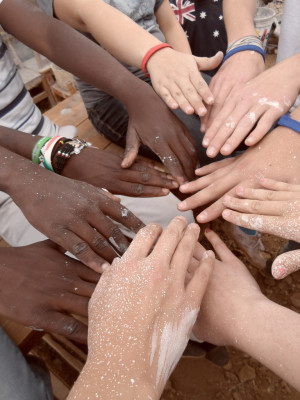
You don’t have to look very hard to notice that some nations show compassion while other’s don’t so much. Take a look at who responds to disasters wherever they occur. Research which countries adopt children. Who builds hospitals and schools?
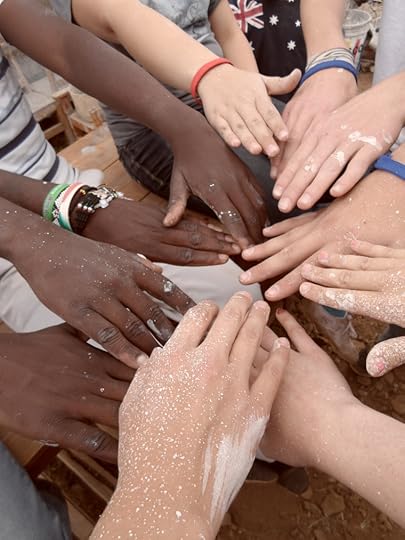
Sure within any nation there are people who genuinely care for others in need. But as a whole, we all can make a list of countries who respond to those in need, because it’s always the same ones.
I have heard some people though, regardless of what country they are from, ask why should they help someone else, especially someone who they don’t know. They really think this way if they believe in a social order. When a culture prescribes to a social order in which a person is born into, then why should they help some in need? That is their lot in life.
Before we Americans get to prideful, we have a history of a social order as well.
An unsettling trend is also happening within cultures—outsourcing compassion. “It’s the government’s job”, “that’s why I tithe to the church”, “someone else who has more time and money will take care of it”.
We expect someone else to take care of those in need while we spend our resources on taking care of ourself and our own.
But why do some people care more?
Some people don’t just say they “care”, but they actually do something about it. They give of their resources to help those in need, bring orphans into their families, manage their time and money with the intention of having enough to respond when needs arise, etc.
Why is it that a high number of people who foster or adopt children have themselves struggled with abuse, neglect, or other relational challenges.
Why do many who enter the field of counseling have themselves been helped by a counselor.
Who better can relate to someone who just faced a disaster or tragedy than one who has gone through something similar?
You have to get in touch with your brokenness to care about others.
“
You have to get in touch with your brokenness to care about others.
—KENNETH A CAMP

Things that break us tenderizes our heart. Something in a person who has overcome compels them to help others in need.
Does that mean that you have had an easy life that you need to go out and screw it up just so you can have a compassionate heart? Ha ha! NO! Of course not.
It just might be a little harder to relate until you do get in touch with your own brokenness. You might need to first realize that every one of us is broken. We all need compassion. And if you don’t think that is true for you, well, you probably won’t have the patience and compassion to care for orphans, homeless, those who face disaster, relational challenges…
But it’s more than getting in touch with your own brokenness.
I hate to disappoint you, but even if we are in touch with our brokenness, our hearts will eventually grow cold if that is the only thing that motivates our actions.
One thing that sets apart a nation that expresses a compassion is one built on Christian principles. Still a set of ideals alone won’t last forever. We see that happening in America.
What we need is a changed heart.
God calls it having a heart of flesh versus a heart of stone.
A heart of stone is:
Cold
Hard
Dead
Not easily softened
Senseless. Incapable of receiving impressions.
A heart of flesh:
Feels
Bleeds
Yields
Regenerates
Is tender
(heart of stone and heart of flesh points come from a sermon by C.H. Spurgeon)
Only God can give us a heart of flesh, one that truly does care for others. He compels us to go outside ourselves, give of ourselves, love those who need to know love.
I will give you a new heart and put a new spirit in you; I will remove from you your heart of stone and give you a heart of flesh.Ezekial 36:26 NIV
Self-reflection: Which list of characteristics describe your heart?
July 17, 2015
3 Things to Learn from a Man Who Lived Unfairness Well
Do We Really Want What We "Deserve"?

That’s Not Fair! They mistreated me. I am misunderstood. I get overlooked. Other people have more money, opportunities, better looks, the “right” color of skin, more talent, more intelligence…

Our society is full of people who whine and cry about the unfairness of life. I don’t deny that injustice, prejudice, mistreatment, and so on, exists. With the omnipresence of media, we hear about it more, but much of it gets over-exposure too.
Do we really want to be treated with fairness? I hear you say, “Yes!” But think about it for a moment. What do we really deserve? Have we had to pay restitution for everything we have done wrong in this life? If you are a Christian or know the Bible, you know that it says that the wages or the price for sin, any…A-N-Y…sin is…Death.
We either don’t believe that or we ignore it.
What should we do when we are on the wrong end of unfairness then? Fight a little harder? Scream a little louder? Just lay down and quit?
That’s what many do. However, some people seem to manage, even thrive in the midst of unfairness. How do they do that? What’s in their DNA that helps them succeed in spite of injustice?
Let me tell you a story of a man who lived unfairness well that for some will be familiar.
Joseph was the eleventh of 12 sons born to Jacob. When Joseph was about 17, it became obvious to his older brothers that their father loved Joseph more than any of them.
The reason Jacob loved Joseph more is because Jacob loved his mother, Rachel. You see 10 of the brothers were born of Jacob’s other wife, Leah, who was Rachel’s sister and their two maidservants. I know, a little confusing, especially for our day. Talk about a soap opera.
Being the favorite son of the father would alone be enough to cause sibling tension, but one day Joseph added to the ire of his brothers by telling them about a dream he had. In the dream, all of Joseph’s brothers and the rest of the family bowed down and worshipped him.
That really made them mad, so they conceived a plan to get rid of Joseph! Some wanted to kill him, but one of his older brothers, Judah, suggested that they sell Joseph into slavery and tell their father that a wild animal had killed him. So, they basically kidnapped Joseph far from home. Stripped him of his clothes, including a beautiful robe his father had given him and threw him into a pit. As they sat around eating and discussing what to do with their brother, a caravan passed by. Perfect timing. They sold him to the caravan, then went home to tell their father the lie.
Did Joseph really deserve that?
The caravan sold Joseph to one of the highest officials in Egypt—Potiphar. Egypt was the super-power of that day.
Even though things weren’t going so well for Joseph, God was with him and helped him be successful at all that he did.
As Potiphar recognized this, he put Joseph in charge of his whole household.
Now Joseph was apparently quite handsome, and Potiphar’s wife noticed him. She made several advances to no avail until one day as she grabbed at him, he dropped his staff and left his robe behind. All she needed to frame him, which she did. Potiphar believed her lies and threw Joseph into prison.
Talk about injustice!
Joseph found himself in a foreign land betrayed by family and thrown into prison with no justice system. However, soon the jailer began giving Joseph responsibilities within the prison and put Joseph in charge of a section of prisoners.
One day, the royal wine taster and baker got on the wrong side of the king who threw them both into prison. The two prisoners soon began having dreams that troubled them. God so happened to give Joseph the gift of interpreting dreams, so he told them what the dreams meant. Both the wine taster and the baker were soon reinstated to the royal court. The baker, sadly, would face a brutal ending while the wine taster would enjoy success.
All Joseph requested in return for the interpretation of the dreams was for them to remember that he was exiled in prison.
Well the baker didn’t have the chance to remember, and the wine taster, well, he forgot. For two years he didn’t remember Joseph until one day he heard the king talking about a dream he kept having. You can guess who interpreted the king’s dream!
If you want to see how the story ends, pick up in Genesis 41. It’s good reading!
What can be worse than being forgotten?
Here is my take. Life is unfair. Sooner or later either by your own doing or not, life will give you a hard punch. The question is how will you handle it? If we expect “fair” treatment, I promise you we will always find what is wrong with whatever or whoever is causing the mistreatment.
But we can learn from Joseph about how to live life well even when it’s unfair.
Here are a 3 things that I take away:
God is faithful. Another 50 cent word is sovereign. It rains on the just and the unjust. For some this nature of God is comforting. For others it causes indignation. But what I think sustained Joseph was that he believed in a God who was never changing, unmovable, always in control. That provides a foundation or a backstop if you will.
God is with us. All throughout the story, when Joseph was sold into slavery, falsely accused, even forgotten in prison, it says that God was with him. God remembered him. I find that interesting. Even though life was severely unfair for this man, God didn’t forget him. He knew him. He thought of him. When we rest in the fact that we are not alone in our whatever unfair position we find ourselves, we find hope.
God helps us succeed. Unfair treatment doesn’t equate to failure. In fact, it just might provide opportunity. We can choose to focus on the unfairness or we can look to see what opportunity to succeed God has for us.
What are some other things we can learn from Joseph or others who unfairness well?
July 14, 2015
How Many Times on Average Does a Child in Foster Care Move?

You may be a person that has moved a lot. But I am guessing whether that was as a child or as an adult, you moved with your family. Or if you are a single adult, you still have a family you call your own even if you don’t live with them. But for children in foster care, it means not only moving from one place to another, but also from one family to another.

And, I bet you had a say in the move. At least you probably knew about it in advance. A foster child? Not so much. Not only do they rarely have a say in a move to another family, but it might be a very sudden decision.
So how many times on average does a foster child move? Ready for it?
Seven times.
Why does this happen?
“Many foster families are not supported enough or well-equipped to care for these children, so foster children are moved often.”
Notice that the emphasis is on the family and inability to care for the children, not the behavior of the child.
Please watch this short video to understand what this means to a child in foster care.
I know. It’s easy for the numbers to overwhelm us. 1400 in the greater Austin area. 17,000 in Texas. 400,000 nationwide.
But move seven times. Seven new homes. Seven new schools. Seven new communities. Seven new sets of friends.
Now that is overwhelming.
The number 1 is not so overwhelming. 1 person. 1 family. 1 action.
Maybe I misread God’s word, but to me it seems to be a non-negotiable. He expects us to care for children who don’t have a family. We either provide a home for them or we help those families who do provide a home.
You won’t be alone.
As the video states, many churches in the Austin area are working together to provide support and equipping for a family who is willing to bring a child into their home.
So take comfort if you are a family considering foster care or adoption. You are and will not be alone.
And, if you are a person or family who is willing to support those families who do foster or adopt, you too can get support and information on how to best help.
Visit www.fosteringhopeaustin.org to get more information. The site is still in progress so check back often for updated information.
If you are not in the Austin area, but want information for your location, contact me. I probably can help you find the information you want. Even if you are in the Austin area and want more information, contact me.
[contact-form]
So what role will you play in a child’s life so that she won’t have to move again?
July 10, 2015
Is Our Arrogance Killing Our Passion for Missions?

I sat and listened to a friend who has served in East Asia for seven years talk about how they are sharing the Good News and discipling new believers. I found joy in hearing the things God is doing through their work. It stirred up feelings of pride. Pride. Now that’s an interesting emotion in response to what he was sharing.

My missionary friend was giving a report of his work to a team of pastors and lay leaders. The more I listened, I sensed an air of…hmm how should I put it? Arrogance? I can’t speak for my friends in the room, so I have to confess my own attitude.
I have been in these kind of meetings before. Representatives of the American church asking a missionary who has been serving faithfully, sacrificially, on the field for an account of the work they are doing. Nothing wrong with that.
We want to hear of the good work. We want to know how we can pray and encourage. We also want to know what kind of return we our getting from our financial investment.
The wealth of the American church creates this mindset. We have the money, so we make the rules kind of thing. We develop what is called a “God complex.” Because of our economic status as a whole, we somehow think we know what’s best for others to do and how they should do it.
Here was a faithful servant who moved his young family to the other side of the world, spending his days making sure he not only can remain in the country, but also planning how he can reach his new neighbors with the Good News of Christ. Many of whom had not heard of the name of Jesus Christ, not even once.
Here are a few questions that came to mind as I sat in this meeting:
If this missionary lived life there the way we live life here, would we withdraw our support? Not a fair question you say? We give that money to support him so we rightfully expect him and others serving like him to be accountable to us for their work.
Why are we not living with the same sense of purpose and urgency right here in our neighborhoods?
Who is asking us questions about how we are sharing about the love of God with our neighbors?
Who asks us how we spend our time and money? Both as individuals and as a church?
If these questions are offensive to us as Christians, then we probably are arrogant in our approach to missions, both locally and globally. When we expect certain activity from our overseas missionaries that is different than what we expect of ourselves right here at home simply because we pay their salaries, we lack a passion for missions.
When this happens, we outsource mission work to others and manage their progress.
However, when we share a passion with our overseas missionaries to see everyone, both here and abroad, have opportunities to know Jesus Christ, we then see ourselves as peers in the work of the Great Commission. We share experiences, support, finances, resources of all kind to see the work done all around the world.
I left that meeting asking God for forgiveness for my arrogant, prideful heart when I had nothing to be prideful about. After all, everything we have comes from Him. He no doubt has a reason for blessing this group of people with incredible wealth.
May we be faithful in stewarding it well. May we have a passion for those who don’t know Him. A passion that compels us to live in the same manner we expect our “missionaries” to live.
July 7, 2015
What Can Help Your Child Feel Secure in Your Relationship?

Did you know that when a parent knows or is decisive about what to do next with their child, the child gains confidence? It’s called mirror neurons. A child will reflect or imitate our actions. If we are anxious and unsure, the child will be anxious and unsure. If we are calm and confident, then…well you get the idea.

A few weeks ago I attended a seminar about the Circle of Security. This is a simple model for parents to use in attaching to their children. In the world of foster care and adoption, this usually is a challenge. Below is a diagram describing the Circle of Security.
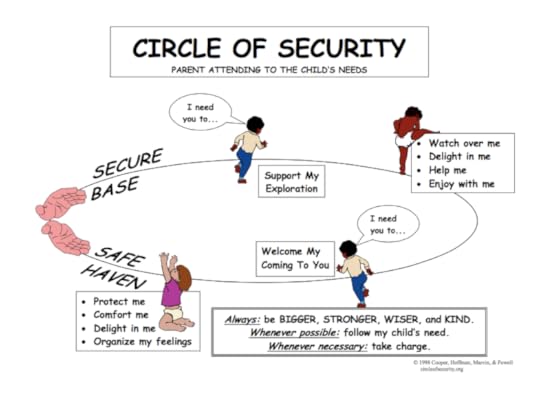
A young child usually will go around this circle several times in an hour especially if in a new environment. A teenager goes around the same circle of security it just looks a little different. Instead of the exploration lasting just a few minutes, it will be hours, days, maybe months at a time. But they still need us as parents to watch over them, delight in them, and help them when they need help. Eventually they will return home for protection, comfort, and processing.
We as parents, whether of a young or older child, need to be a safe haven and a secure base for them.
Here is a great short video that explains this circle of security in more depth.
A child begins this journey the moment they are born. They constantly are exploring their new, scary world. If their parent is their to protect, soothe, and delight in them, then they confidently venture further out into this world. The cool thing is that our natural instinct as parents is to do exactly this for a newborn child. Take a look at this precious video of Baby Oliver waking up:
As parents and caretakers are normally drawn to a newborn like this. We want to protect and comfort them.
But what if Oliver woke up in an orphanage with no one there for him? Or what if he woke up in an abusive home? How would his wiring and ability to attach be different?
Sadly children from a hard place often miss out on the bigger, stronger, wiser, kind caretaker/parent in their life. For some, it might be for a few hours or days because of a neonatal medical cause. For others it is more chronic like abuse or neglect.
Main Takeaways
I can tell at any moment where my child is on the circle—exploring their world, returning home, or in their safe haven. When you identify this, you can easily tell what they need from you.
My abilitytoprovide a secure and safe for them to return willgreatlydetermine how well mychildattaches.
Secure parents can stand back and see what they are doing (and not doing) for their children. (Dr. Kent Hoffman)
Secure parents can admit where they struggle and, for the sake of their children, work to find another way. (Dr. Kent Hoffman)
I need to learn to be with my child enough so that they feel like they are on their own.
I could keep going, but I hope this interests you enough to explore this concept. If so, please visit CircleofSecurity.net.
July 3, 2015
One More Year Until Senior Discounts!
5 Things I Have Learned Since Turning 50
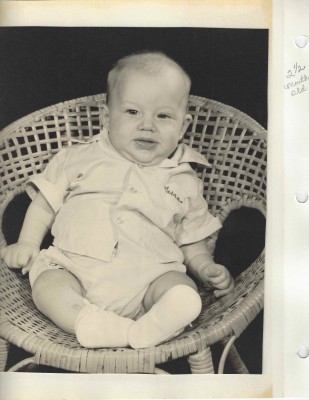
Today is my birthday. Yep. Turned 54 at 8:22am this morning according to my birth certificate. I was born in Monterey, California at a military hospital. My dad was in the Navy attending language school. The word is, I was about a week late. Some family from Texas drove out for my birth, but missed my arrival because they had to go back home.
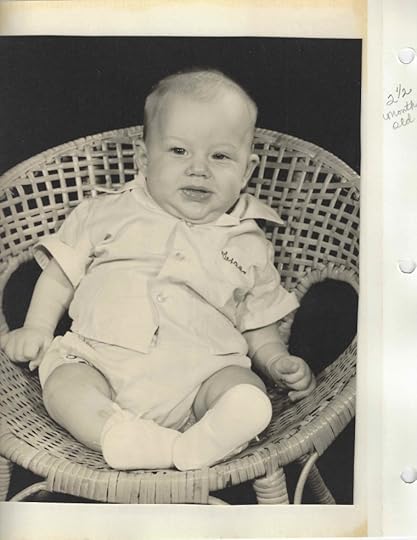
Who is that fat little guy?
I guess in many ways I have been a late to a lot of things in life. But like they say…better late than never!
I joke around with my friends that I can’t wait until I turn 55 because we will get discounts on both ends of the spectrum. I will get senior discounts, and my son, who will be five, will still get free meals. Sweet!
I was thinking back over my life, specifically the past five years which have flown by faster than any other time in my life.
I never guessed I would be doing what I am doing now. Five years ago I stood at a crossroad not sure where either path would take me. One path potentially took us back overseas to serve as missionaries for an unknown length of time. The other path honestly frightened me more—foster care and adoption. I had resolved that I would never be a father to a child that I called my own.


Both paths were born out of obedience. I wanted to obey God’s call to respond—respond to going to the nations; respond to the fatherless. As you probably know, I, along with Danielle, chose to go down the path of foster care and adoption. Why did this path frighten me more than moving overseas to serve as a missionary? It consisted of more unknown outcomes, at least in my mind. And, I wasn’t sure in my abilities to parent a child, either temporarily or forever.
Another caveat to making that decision five years ago was that I didn’t know what career I would pursue if we didn’t serve as missionaries..
In 2011, we did become foster parents. And I decided on a new career path. I became a writer.
I knew nothing about either one!
That same year I agreed to be the president of the board of a new nonprofit that a good friend was starting. I knew nothing about how to do that either!
Now I understand why these past five years have flown by!
Strangely some days, many actually, I wonder if I have accomplished anything these past few years. But as I look more closely I feel better. We adopted a son. I published a book about foster care and adoption. And I helped that nonprofit become a thriving ministry in its community.
Each of these and many other adventures have taught me a few things. Sure what I learned isn’t new in any respect, but sometimes we have to live it to really learn it.
5 Things I Have Learned that I Can Take into My Second 50 Years:
Go ahead, make a decision. Making life altering decisions can freeze a person. Any of these easily could have done that, but we stepped out in faith that God was leading us. God proved faithful in showing us what to do each step along the way.
Don’t be afraid to fail. Fear of failure shuts down even the best. But in my 50s I recognize that I don’t have time to be afraid of failure. If something doesn’t work out, I can recalibrate and try again or try something else.
Don’t take myself too seriously. When I was younger, like most young men, I wanted to change the world. Not that I still don’t want to live a life of influence, but I don’t care if anyone knows who I am. I don’t care if I ever become a well-known writer and blogger. I am content investing in whoever God places in my life, especially my son.
Stay in the moment. I have written about this a lot. But it’s true. I can’t undo any of the past, and I can’t live tomorrow today. A friend once said, “God gives us the grace to live just one day at a time.”
Keep trusting. If God has taught me anything else besides staying in the moment over the past five or so years, it’s this. He proves Himself faithful over and over.
I have no doubt that I will find myself at the crossroads of big decisions again. In fact, we have some before us now, including mission work overseas.
Thank you God for these 54 years you have graced me with along with my beautiful family. They are a gift from You.
Question for You: What is one thing you have learned over the past 5 years that changed the way you live life?
June 30, 2015
Look at Him Run!
Finding Delight in Your Child
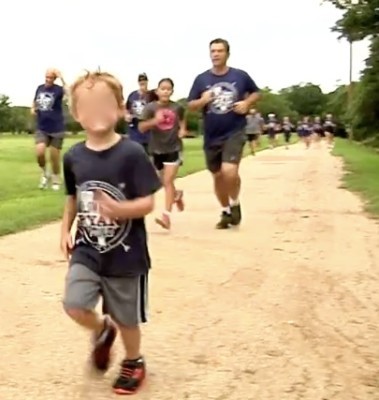
It was a 5K fun walk/run event. The annual event is a memorial in honor of my friend’s son who tragically lost his life during his freshman year in college. We were excited to be able to attend this year. My friend has known our son from the when he was a baby and first placed in our home. She has babysat him and given him swimming lessons. Definitely a sweet connection.
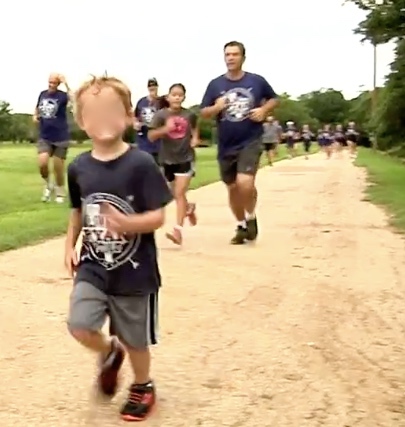
Our son loves anything that resembles a big party. So as things are getting organized, he is running around playing, laughing and talking to everyone. They gathered us for a group photo. Everyone held helium-filled balloons. I put my son on my shoulders so he could see. Then they fired a starter’s pistol. A small flock of white dove took to the sky followed by hundreds of blue and red balloons.
My son watched with excitement as he climbed down off my shoulders. Anticipation filled the air as well. Then the gun fired again to begin the race.
We stood in the back of the pack intending to leisurely enjoy this fun walk/run with an emphasis on walk. Both Danielle and I were nursing injuries—hers a knee; mine an ankle and foot.
But our little guy had a completely different plan in mind. As soon as he saw the pack begin to move, some running, some jogging and others walking, he didn’t even look around for us, he took off in a full sprint!
I knew I had to follow, so off I went laughing as I weaved through the crowd trying to stay close to him. Now keep in mind he is about 40 inches tall and weighs 35 pounds and he is kicking his heels up with a great stride, not just trying to keep up with the crowd but passing many of them.
Other runners began shouting, “look at that kid!”, “what a stride!” and so on.
I just knew, or maybe it was more hoping, he would slow down and even begin walking, especially when he realized that he had taken off without his mommy and daddy. But that didn’t happen.
Instead, he began yelling at people as he came up behind them, “I am going to pass you!”.
I loved every minute of it even with my ankle throbbing. I delighted in seeing his joy, competitiveness, and natural skill.
Finally after the first mile lap, my son began to slow down and even walk some even though he would start running anytime someone passed us. Then he slowed to a complete walk about half way through the second lap. He even began yelling at runners passing him, “it’s ok. You can pass me!”
As we walked, we talked. And talked. About this. About that. Nothing too important. Just enjoying each other’s company.
Then he grabbed my hand and said, “Come on Daddy, let’s go! When we hold hands we get booster power!” You bet I held his hand and took off running again.
“You know what Daddy?” “What son?” “We make a great team!” “Yes son, we do make a great team!”
In that moment, at that event, I treasured every moment. I have no guarantee how long we will have together on this earth, so I am going to use every moment I have to delight in him as my son.
June 26, 2015
6 Life Lessons Your Child Will Learn When You Disciple this Way
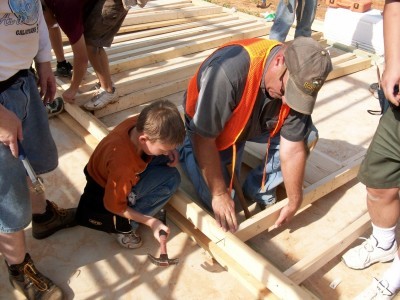
We all know that children grow up fast. When it’s not our own children, we notice how much they grow and change every time we see them, especially if it’s only a couple of times a year. But when they live with you…That’s another story.

The days melt together until one day you wake up and your kids are moving out of your house and beginning their lives out on their own. “Have I taught them everything they need to know?’ you ask yourself. Granted you will still have opportunities to give them guidance after they leave your house, but never like you did when they lived with you.
When it comes to discipling—teaching them the ways of God—how do you do it? Do you read God’s Word with them and teach them that way? Do you have family devotionals at mealtime or bedtime? Do you make sure they go to church regularly and hope that they learn something there?
The question is how much of that sinks in and sticks with them? I am sure some does, or at least I hope some does.
I think there is one sure way to disciple your children so that it does stick with them.
Live a sent life.
Serve other people. Go on mission trips. Together. Don’t just send them, go with them. Especially with other families.
Serving together in a mission setting, whether it’s for one day or several, along with other families will give you many life application opportunities. Your children will learn from you as you model God’s way for living. This way of discipling will reinforce everything you verbally teach them.
Here are 6 Life Lessons your child will learn:
How other people are important. We all think we are the center of the universe. And, in some aspects I guess that is true. Our children need to know that we delight in them. They need to know that God delights in them. During there first year or so of life that’s imperative. But, then they need to learn that others are just as important regardless of their status in life. You can tell them this until you are out of breath. But until they actually place someone else’s needs above their own, it probably won’t sink in.
How to overcome challenges. On a mission trip or a day of serving someone else, most likely something will go wrong or present a challenge. Your children will watch how you handle adversity. Will you scream, cuss, and throw things. Or will Holy Spirit fruit, like patience and kindness, manifest through your actions. I guarantee they will remember your response for the rest of their lives.
How to serve. It’s one thing to talk about living God’s way. This way of discipling will teach your kids to “walk the talk”.
How to appreciate what they have. Ever think, “Geez, my kids are spoiled!” Most of us spend more time thinking about how we can entertain and show our kids a fun time than we do about how we can do things together that will disciple them. When we spend every Spring Break and most of summer break vacationing we create an entitlement attitude rather than one of service.
How to pray. No better way to learn how to pray than when you really need to talk to God. In this setting we get to see God answer, sometimes immediately. That builds faith.
How to depend on God. When we spend a day or more focused on serving others, we look to God for guidance, wisdom, His presence and more. We get to see His power.
Mission trips provide a microcosm of life. What could take years for our children to experience, if ever, can, and probably will happen in just a few days in a mission trip environment.
Can you share a brief story of how you have seen your child grow in their faith while serving on a short-term mission trip?
June 23, 2015
An Interview with a Missionary—Mark and Laura Heffner serving in Taiwan
I met Mark Heffner in 2006 during Chinese New Year. We both were on a short-term trip to Pattaya, Thailand handing out Chinese Bibles to Chinese tourists visiting on holiday by the thousands. That trip influenced me more than any other short-term mission trip I have gone on before or since. First time in Thailand. First time to witness hundreds of Chinese running, grabbing, begging for copies of a Bible in their language. Beyond impactful.
And there was Mark standing right in the middle of the mass of humanity calling out to the tourists in his fluent Chinese. Engaging. Laughing. Connecting. Beyond impressed.
I hope you take a few minutes to watch or listen to this interview with Mark and his wife, Laura. They have served in Taiwan for many years, raising their children there. Enjoy!
If you want to follow and/or support Mark and Laura Heffner, contact them in the following manner:
To get updates or information about sending a team:
Facebook – https://www.facebook.com/marknlaura.heffner
Email – Heffner_ROC@hotmail.com
To support the Heffners:
http://www.cmcmissions.org/donate
CENTRAL MISSIONARY CLEARINGHOUSE
P.O. Box 219228
Houston, Texas 77218-9228
1-800-CMC-PRAY (1-800-262-7729)
Office: 281-599-7411
Fax: 281-599-7511



